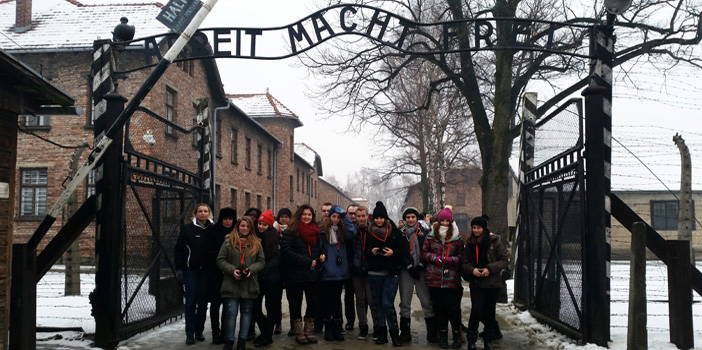For the 70th anniversary of the liberation of the Auschwitz-Birkenau camps, the General Council of the Alpes-Maritimes organized a visit to the camps in Poland for 11 middle schools in the region. The first Memory trips were initiated in 2003/2004. On Tuesday, February 10, about 15 students per class went to Krakow, Poland.
To participate in this trip, students were selected based on their application. They had to write a motivation letter. The most convincing ones were chosen. Ikbal Salah and Ibtissem Raoufi are two 9th-grade students from Maurice Joubert Middle School in Nice. They are happy to be able to participate. They clearly explained why they wanted to go on this trip. “We are part of a ZEP school, we did not think we would have the opportunity to be here today. The General Council gave us this opportunity. It is always good to see with our own eyes to better understand what the teacher explains and tells us. Seeing pictures in the history book is different from being in the actual place,” explain the young girls.
“It’s important to know what happened in history and to see it for ourselves. It’s an opportunity that we might only have once in our lifetime,” adds Ibtissem.
Once on site, calm, attentive, and interested, the students enter the Birkenau camp. The 9th-grade students from Alphonse Daudet Middle School in Nice were also present. Aware, Lisa Schmittfull de Soussa explains: “I decided to come because I think it is one of the biggest mistakes of humanity that happened. It’s important that this does not happen again and that even the current generations understand the consequences of racism and discrimination.”
A realization
Disconcerted, shocked, they do not understand. Yet they seek to understand. Their reflection and approach demonstrate maturity. They respect these places and behave like adults.
The cruelty testified by these camps and buildings amplifies the inhumanity in which innocent people, families, civilians were unjustly plunged. Years later, each and every brick of each structure tirelessly bears witness to this horror.
Let’s return to these 15-year-old adolescents. They studied it, they know it. Now, they are aware. It’s time for questions. Questions whose answers are difficult, if not impossible, to find. The adolescents whisper, their voices choked: “But why kill them instead of talking to them? I’d rather die than kill someone. It’s horrible and disgusting. We think it’s impossible that anyone could have survived there when millions of people passed through this place. It’s touching and horrifying.” Emotional testimonies that these middle school students could not refrain from expressing, talking amongst themselves. Now, they return to Nice, clear-headed, aware of what the rejection of others can cause.
The Holocaust, 70 years of remembrance, 70 years of discussion, 70 years of indignation. This makes writing about this experience all the more difficult. Upon our arrival, kilometers of barbed wire fences are covered by a gray, white, sad weather. The sky is not visible. It hides. It is ashamed to bear witness. Just like our eyes resting on the train tracks. They were used to deport millions of innocents, because they were Jewish, because they were Roma. It is with bowed heads that we enter such a place. Our backs chilled by the horror, our hearts frozen by the shame. We push open the doors of death and evil. Our feet retrace the arduous path of these people who were tortured, humiliated, and killed. The result of an organization as precise as it was cruel. This visit is a trial, but it is essential.
At a time when human beings show they are capable of murder or humiliation under the guise of the other’s difference, at a time when the attacks that struck France on January 7, 2015, underline the madness, the cruelty of which a single man is capable, the duty of memory, awareness, and tolerance are our weapons.



